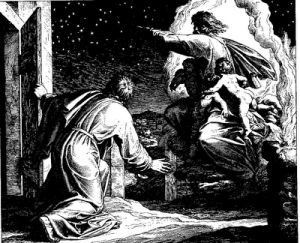 Though Genesis 12:1-3 does not contain the words “elect” or “chosen,” this passage is often cited as a defense of God’s Unconditional Election of some individuals for eternal life. In this text, God informs Abram that he will become the father of many nations so that through him, all people on earth might be blessed.
Though Genesis 12:1-3 does not contain the words “elect” or “chosen,” this passage is often cited as a defense of God’s Unconditional Election of some individuals for eternal life. In this text, God informs Abram that he will become the father of many nations so that through him, all people on earth might be blessed.
Genesis 12:1-3
Now the Lord had said to Abram: “Get out of your country, from your family and from your father’s house, to a land that I will show you. I will make you a great nation; I will bless you And make your name great; and you shall be a blessing. I will bless those who bless you, and I will curse him who curses you; and in you all the families of the earth shall be blessed” (Genesis 12:1-3).
In referencing this texts, Calvinists often remind the reader that Terah, Abram’s father, was an idol-worshiper (Josh 24:2), and that if God had not unconditionally intervened in Abrams’ life, Abram would have been an idol-worshiper as well.
John Calvin on Genesis 12:1-3
In fact, Abram may have been an idol-worshipper when God called him. Here, for example, is what John Calvin wrote about Genesis 12:1-3:
This calling of Abram is a signal instance of the gratuitous mercy of God. Had Abram been beforehand with God by any merit of works? Had Abram come to him, or conciliated his favor? Nay, we must ever recall to mind, (which I have before adduced from the passage in Joshua,) that he was plunged into the filth of idolatry; and now God freely stretches forth his hand to bring back the wanderer. He deigns to open his sacred mouth, that he may show to one, deceived by Satan’s wiles, the way of salvation (Calvin, Calvin’s Commentaries, I:343).
God’s “choice” of Abraham in Genesis 18:17-19
In referencing Genesis 12:1-3, Calvinists often point to Genesis 18:17-19 as proof that Abraham was divinely chosen by God because. The NIV translation of Genesis 18:17-19 says this:
Then the Lord said, “Shall I hide from Abraham what I am about to do? Abraham will surely become a great and powerful nation, and all nations on earth will be blessed through him. For I have chosen him, so that he will direct his children and his household after him to keep the way of the Lord by doing what is right and just, so that the Lord will bring about for Abraham what he has promised him” (Genesis 18:17-19, NIV).
Several things can be said about the Calvinistic interpretation of Genesis 12:1-3 and 18:17-19.
First, there is no specific reference to calling or election in these texts. Such theological concepts must be read into them. This is exactly what the NIV translators have done. Though the original Hebrew simply states that God has “known” Abraham, the NIV changes the word to “chosen.”
The NIV, following its usual theological bias, doesn’t even bother with a footnote to tell its unwary readers that it has altered “known” to “chosen” (Marston and Forster, God’s Strategy in Human History, 230).

The surrounding context of Genesis 18:18-19 reveals what it means for God to have “known” Abraham. It does not mean that from before the foundations of the world, God chose or elected Abraham. This idea is not found anywhere in the text. To the contrary, the context reveals that as a result of God calling Abram in Genesis 12, God and Abraham have become friends, so that now, in Genesis 18, God wants to consult with Abraham about what is going to happen to Sodom and Gomorrah.
The statement “I have known him” means that God has made Abraham His friend (cf. Amos 3:2; Hos 13:5; Isa 41:8; Jas 2:23).
No one, of course, would deny that God did choose Abraham, or that his friendship with Abraham was a result of his own free choice. But it is one thing to say that God’s “knowledge” of Abraham was a result of his “choice” of him; it is quite another thing to say that his knowledge of him was equivalent to his choice. It is the friendship itself, and not the choice prior to the friendship, that is the ground for God’s confiding in him (Marston and Forster, God’s Strategy in Human History, 231).
Nevertheless, despite the fact that Abram is not specifically said to be “elect” or “chosen,” the overall trajectory of the biblical account is clear: God did specifically call out Abram from all the people of the world.
Why Did God Call Abram?
Of course, notice carefully what Abram was called by God for.
Nowhere does the Bible ever say that Abram was called by God to receive eternal life. Quite to the contrary, the text explicitly says that Abram was called by God to be a blessing to the world (Genesis 12:2-3). So this is the second argument against the Calvinistic interpretation of Genesis 12:1-3. God did not “elect” Abram to give him eternal life; God elected Abram so he could serve God’s purpose of being a blessing to the world.
In support of this is the fact that Abram did not actually receive eternal life from God until many years after He was called by God to be a blessing. In the case of Abraham, his regeneration followed his election by many years (cf. Genesis 12:4; 16:16; 17:1).
God first spoke to Abram in Genesis 12, but it was not until Genesis 15 that Abram believed God. According to Paul in Romans 4:3, Abraham was justified when He believed God, which occurs in Genesis 15:6.
The so-called Unconditional Election of Abram in Genesis 15 did not immediately result in Abram receiving eternal life. This shows, even more interestingly, that Abram, as an unregenerate person, is able to hear God (Genesis 12:1-3; 13:14), see God (Genesis 12:7), respond to God (Genesis 12:4; 13:18), and teach others about God (Genesis 13:3-4).
And even though Abram made many mistakes before he was a believer, he made many of the exact same mistakes afterward (cf. Genesis 12:10-20 with 20:1-18). The entire record of Abraham’s life in Genesis disproves the Calvinistic system of theology in many ways.
 There is one final point to take note of from Genesis 12. Some Calvinists argue that if God had not specially intervened in the life of Abram, Abram would have ended up as an idol worshipper, just like His father. But this is far from obvious in the text.
There is one final point to take note of from Genesis 12. Some Calvinists argue that if God had not specially intervened in the life of Abram, Abram would have ended up as an idol worshipper, just like His father. But this is far from obvious in the text.
In fact, it is just as likely that God’s call of Abram was a response to Abram’s response to what he learned about God through general revelation. As we saw in the previous chapter about Total Depravity, the Bible teaches that God has revealed Himself to all people in numerous ways, such as through conscience and creation.
Furthermore, we saw that when people respond to this general revelation of God, God obligates Himself to provide them with further revelation. Maybe God’s special revelation of Himself to Abram is one such example in Scripture. This is speculation, of course, but so also is the Calvinist assertion that Abram knew nothing about God prior to God’s calling of him in Genesis 12.
Ultimately, the point of God’s calling of Abram in Genesis 12 and 15 has nothing whatsoever do with the election or predestination of some to receive eternal life.
Instead, God’s calling of Abram was so that he would be a blessing to the world.
God did call Abram. But it was not necessarily unconditional, nor did it have to do with Abram’s eternal life. The calling of Abram was a calling to service.
God selected Abram to be a blessing to the world.
If you want to read more about Calvinism, check out other posts in this blog series: Words of Calvinism and the Word of God.



Cornelius was the first Gentile Christian because he was a god-fearer. He was almost there. It is likely too that Abraham was a ‘god-fearer’ before he heard God’s specific call. The Reformation was obsessed with the idea that nothing anybody DID qualified that person for eternal life. This is shown in the Calvin quote. The Reformation was concerned with denying the merit of works which was part of Catholic theology. (Now by denying the merit of works the Reformation established merit firmly at the centre of its theology, a thing the Bible never does and hence so much confusion). What Abraham did before God’s call might not have meritoriously qualified him but it would have facilitated the process. Abraham was orientated to obey God as Cornelius was.
To get to Abraham in the context of his orientation before God called him, I have to start with Melchizedek. As I researched this biblical figure, I learned from the Jewish writings that the ancient Jewish sages declared Melchizedek was none other than Shem, the eldest son of Noah. Abraham is the ninth generation of Shem’s lineage (Gen. 11). While Shem lived to the age of 600 years, Abraham died at 175. Shem would have been approximately 390 years old at Abraham’s birth. He would then not only have lived in Abraham’s lifetime, but also outlived Abraham to see the 11th generation of his descendents – Jacob!
I have often wondered whether Abraham might have somehow learned of the living God at Shem’s feet, which would explain why he so readily recognized God’s voice when called by him? The answer presented itself much later when I was glancing through the ancient Book of Jasher (mentioned in Joshua 10:13 and 2 Sam 1:18). Chapter 9 notes that Abram (his name at the time) went to Noah and Shem at the age of ten. He remained there for 39 years and was taught the ways of the Lord.
This information certainly opened up valuable understanding for me.
Interesting point about the merit of works becoming central to Reformed theology (which it is) because they spent so much time denying it. This creates much food for thought for me…
One can always find books that supports one`s worldview, however, that neither makes the book nor the worldview true. The Bible, on the other hand, is always true, even if or when we do not agree with it. “Let God be true, and every man a liar. Calvinism has a bias that infects the view of Scripture. No less however, does the anti-Calvinist infect their view of Scripture, because the whole concept of election is repugnant to the human mind. Every attempt to reduce the ways of God to a syllogism will fail at some point, as it does here.
The Reformation was a reaction against Catholic teaching. Other theologies are a reaction against the Reformation. Reactions against reactions are doomed to be confused. As we answer a fool we are doomed to be like him. The Reformation was doomed to be merit oriented (in a negative way) just as Catholicism at the time was merit oriented (in a positive way).
Yes, but we need to be careful not to equate our understanding of the Bible with the Bible itself. We all fall into this trap from time to time.
What a post! So much food here. I’m truly feasting like I have never before. When will the rest of this series be completed?! I shared the link again today.
I SO want to complete this series… My goal was to complete it by the 500th anniversary of Luther nailing the 95 Thesis to the church door in Wittenberg (which would have been Oct 31, 2017), but clearly that didn’t happen …
Currently I am working through a series on the Gospel. After that, I think I might get back to this series on Calvinism.
Please return to this series. I have quite a few “Reformed” colleagues and friends and am gaining so much insight here. I am enjoying reading these blogs!
Thanks!
I really, really want to! I am currently writing a long series of posts on key words from the gospel (many of which relate to this series on Calvinism). Once I am done with that, I will likely return to this series…
Your point, “The calling of Abram was a calling to service” should be emphasized. The doctrine of election is not about individual salvation as the Calvinists have adulterated it to become. It is about service, CHOSEN specifically for a PURPOSE (of serving), not necessarily salvation although that is likely to follow.
When will the posts return!?
Here’s a revised version of your explanation, incorporating the additional point:
God’s calling of Abram (later Abraham) was part of His plan to bring spiritual blessings to the world through Christ. As Ephesians 1:3 says, *“Blessed be the God and Father of our Lord Jesus Christ, who has blessed us with every spiritual blessing in the heavenly places in Christ.”* This spiritual blessing is ultimately salvation and all the benefits we receive in Christ.
But here’s the key point: God could not use an unbeliever as the means through which spiritual blessings would come to the world. The blessings God promised through Abram required him to be in right relationship with God, which is why God worked in Abram’s life to bring him to faith. In Genesis 15:6, we read, *“Abram believed the Lord, and He credited it to him as righteousness.”*
God’s choice of Abram was not random but based on His sovereign plan and foreknowledge. God called Abram, brought him to faith, and made him spiritually blessed so that he could be the channel of blessings to others. Through Abram’s lineage came Jesus Christ, who is the ultimate source of spiritual blessings for all who believe.
In short, God’s plan ensured that Abram would become a believer and spiritually blessed, because an unbeliever could not be the means for the world to receive the ultimate spiritual blessing in Christ. This highlights God’s wisdom and purpose in choosing and preparing those He uses to accomplish His plans.